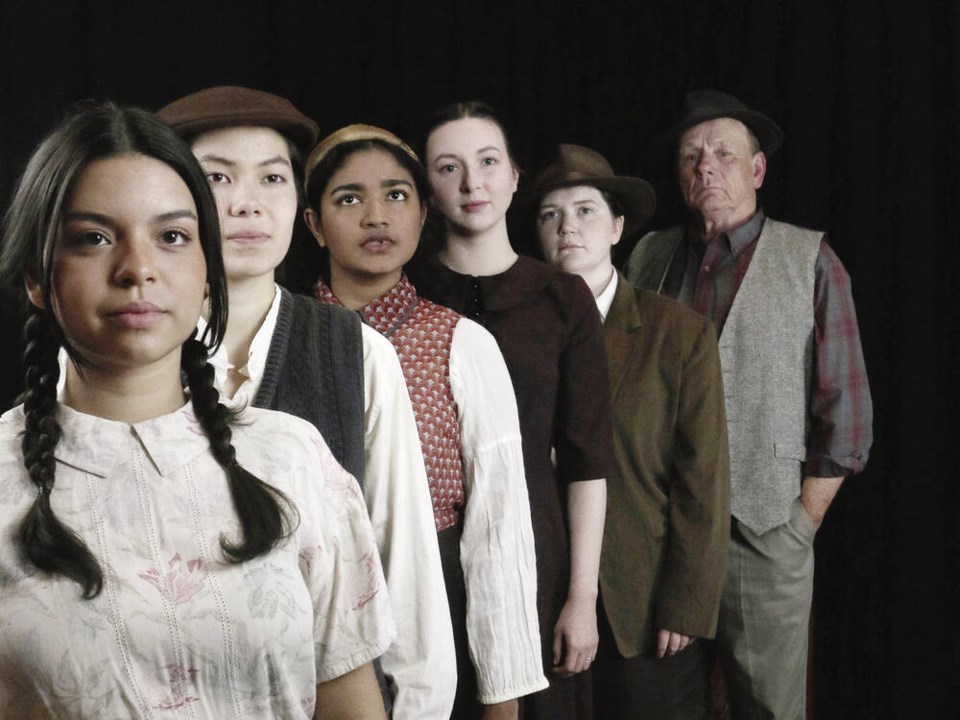TEN LOST YEARS
Where: The Canadian College of Performing Arts, 1701 Elgin Rd.
When: Oct. 17-20
Tickets:
Barry Broadfoot’s Ten Lost Years, an oral history featuring Canadians who survived the Great Depression, made for a thrilling book in 1973 and riveting Toronto stage production one year later.
Fifty years after the fact, the play has lost none of its impact. “These aren’t dramatic, made-up moments,” said Glynis Leyshon, who is directing a production of Ten Lost Years for the Canadian College of Performing Arts. “These are moments people lived and experienced.”
The book by Broadfoot, a former Vancouver Sun reporter who spent the last years of his life in Nanaimo, was adapted into a piece of verbatim theatre by Jack Winter, with period folk music by Cedric Smith. The Canadian production about the experiences of Canadians between the years 1929 and 1939 was an instant hit, and left an indelible mark on Leyshon, who saw the Toronto original when it premiered in 1974.
“In the ‘70s, an absolutely Canadian story, with Canadian names, about the Canadian experience, was revelatory for me. It made a huge impression,” she said.
Leyshon imagines the CCPA production of Ten Lost Years will have a similar impression on students in the school’s studio ensemble. Ten Lost Years is the first of three plays that will be produced this year by the comprehensive training program, and she has no doubt it will stand alone when their 2024-25 season comes to a close.
“When I thought of a play that would give the ensemble an experience of a different style of theatre, it was front of mind. And I was not disappointed when I went back to it.”
Unlike the the Tony Award-winning Broadway smash, Come From Away, which blends the stories of residents from tiny Gander, Newfoundland, with the events of Sept. 11, 2001 in the United States, Ten Lost Years is pure Canadiana circa the 1930s, from mines in Sydney, Nova Scotia, and to skid row on Cordova Street in Vancouver.
“It gives you those references, and there’s a fluidity to it. It’s across the country, in the voices of Canadians that Broadfoot interviewed.”
The original production put the focus on farmers, and was designed to be performed by six men and four women. Leyshon is working with a cast of six (one of whom, musician-actor Mark Hellman, is not a student), so trimming was needed to make the on-stage/off-stage assignments more manageable for the participants.
Leyshon, who has five-decades of experience in Canadian theatre, started by shortening the original production’s two-hour run time. The music was kept intact, she said, but some of the longer passages of dialogue were removed. Other cuts were made, to better suit the mixed-gender cast, Leyshon added. “The original script called for more male actors, so we’ve put the focus on women, who were very much of the part of the original.”
Some of the verbiage from the time is no longer used, which led to further tweaking; Leyshon didn’t want the novelty of certain dialogue to lessen the impact of the stories being told. The moments of real grittiness, however, remained, such as the woman interviewed for the book who spoke of being raped by a farmowner.
“There’s a truth to that kind of storytelling, so we tried to preserve that.”
The stage version of Ten Lost Years came along at a time when theatre companies in ╬┌č╗┤½├Į were beginning to embrace verbatim theatre, Leyshon said. “It was a touchstone production in the 70s,” she said, due to its stark re-telling of a decade unlike few others in history. Which is why she gave each of the students participating in the CCPA production an important assignment beforehand.
“This is a diverse group, from families all over the world,” she said. “One of the things I asked them to do was go to their parents or grandparents and ask them if had any family stories from that era. These students were stunned, because they were receiving stories and a family history they had never heard before. And that opened a dialogue within their own families. That helped them bring a skillset to this style of storytelling.”



